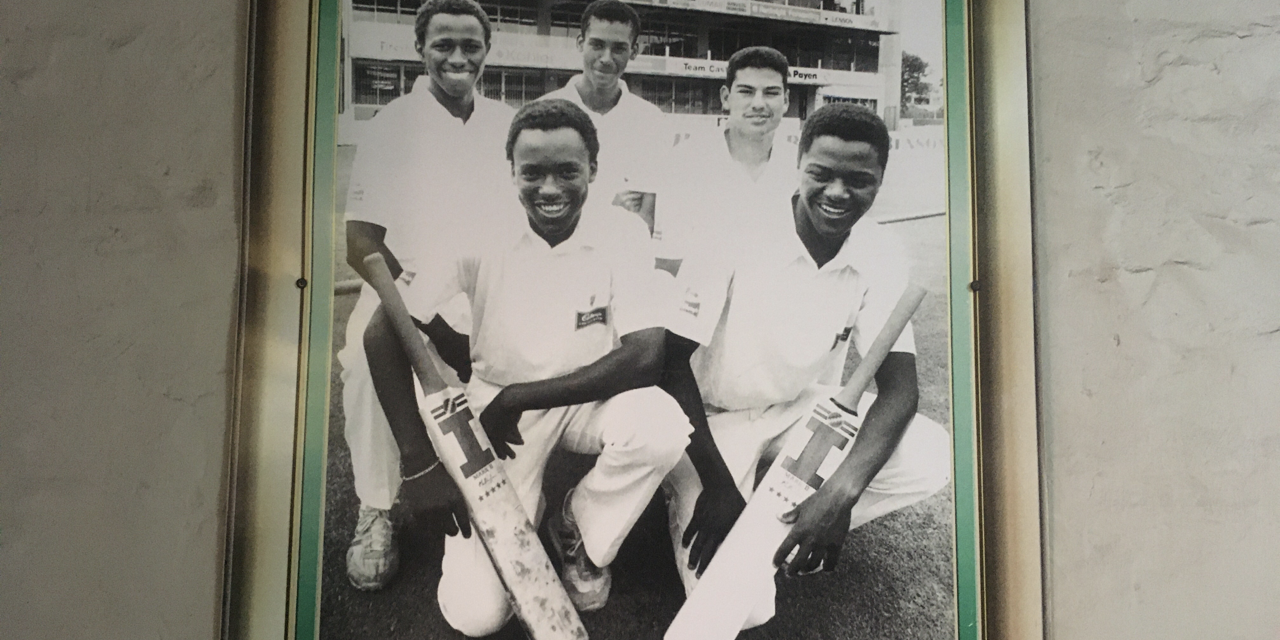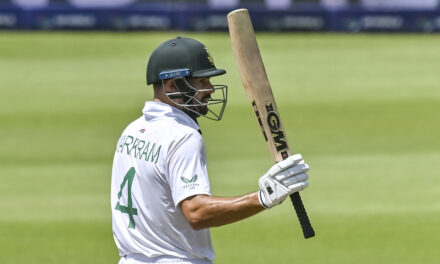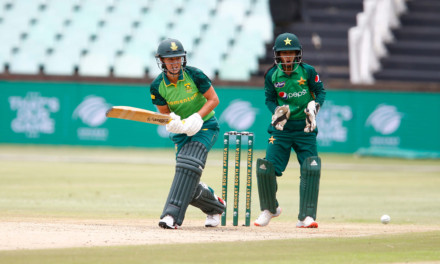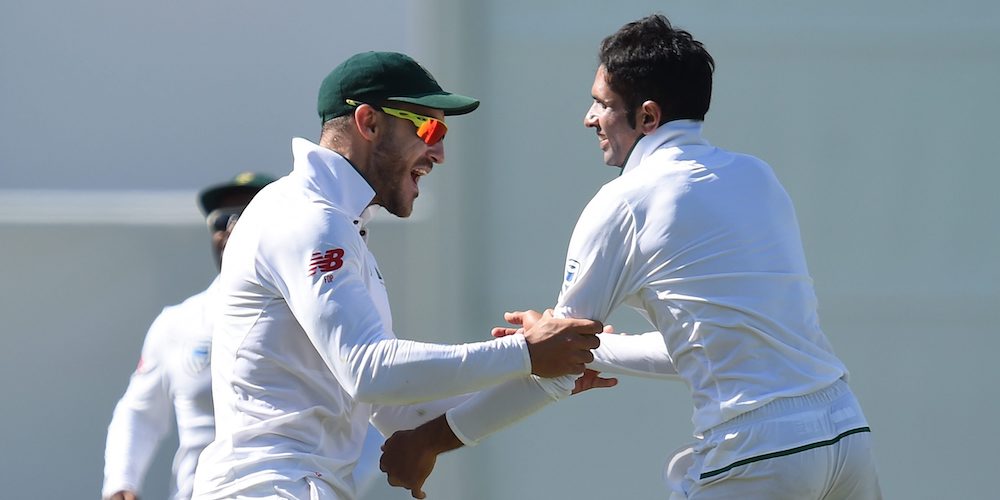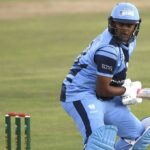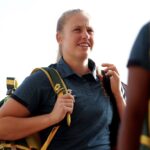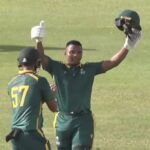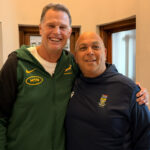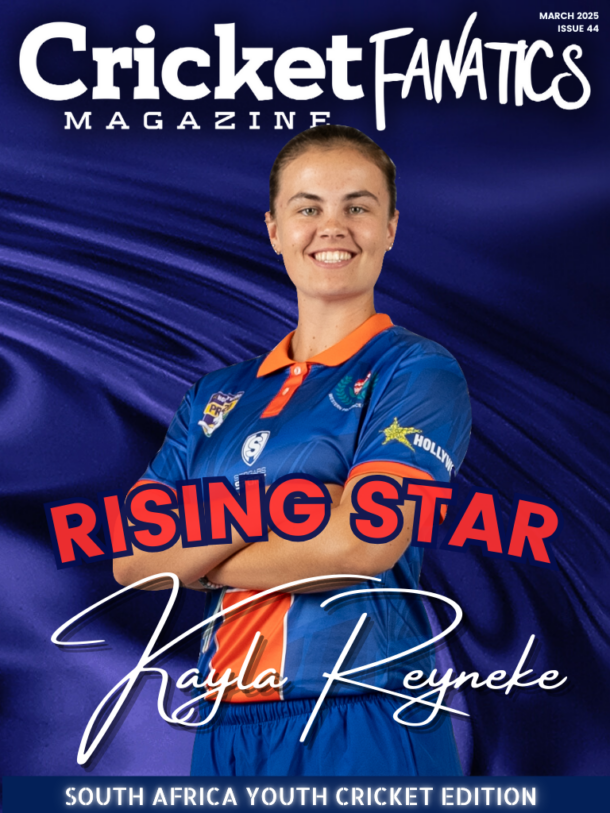The glorious left-handed batter from the dusty streets of Seyisi in Gqeberha will forever hold legendary status in the region’s club cricket fraternity. This is Kenneth Mahuwa’s story, one which reveals the consequences of the lack of opportunities in the early 90s, Ongama Gcwabe narrates.
If you’ve ever been to St. George’s Park Cricket Stadium, you would’ve noticed pictures of Eastern Province teams and players behind the stadium stands.
As a kid growing up, you would always wonder: who are all these cricketers?
One picture that has always stood out to me was of five young black cricketers kneeling, posing for a photo in front of the Park Drive End or the Graeme Pollock Pavilion.
The five young men were all part of the 1991 EP Nuffield Team, which is known today as the EP U19 team that features in the Khaya Majola Week.

Front Row: Derrick Sontundu and Lulama Masikazana.
This story is about Kenneth Mahuwa, a left-handed opening batter and usually first-change seamer for United Cricket Club and EP Cricket back in the 90s.
Like many black cricketers of the past, and to an extent, like many black cricketers of the present generation, Kenny’s career cannot be narrated without the ‘what ifs’ and the ‘what could’ve beens’.
His story is another example of what transpires decades down the line should a cricketer not be given opportunities.
Kenny’s father was a cricketer himself but made a name for himself as a skilled groundsman. It was inevitable that Kenny would follow in his father’s footsteps and fall in love with the game.
“I was 14-years old when I started,” Kenneth Mahuwa told Cricket Fanatics Magazine in an exclusive interview.
“I played one season and then I was promoted to play for the A-side. The A-side had the likes of Khaya Majola, Allistair Coetzee and Danny Jordan to name a few. This was before unification and we used the Wolfsen Stadium as our home ground as the United Cricket Club.
“In 1991, when the Den Qeqe stadium was built, it was our main stadium and Adrian Birrell played in our club at the time. They were the first whites to play in our club as far as I can remember.”
Mahuwa was a talented opening batter and was often selected to represent Eastern Province in age-group cricket. In 1991, he was part of the province’s U19 team that took part in the Nuffield tournament.
“In 91′ I was part of the Nuffield side for the second time in a row. At the end of 91′, I was picked in the EP B side and I played about three games that season. It was in 92′ when I started being a regular in that side,” Mahuwa recalled.
“In March, I got selected in the SA U19 side and we toured the West Indies. We had Herschelle Gibbs, Dale Benkenstein, Quentin Still and Lulama Masikazana. I still remember how fluent my game was at the time.
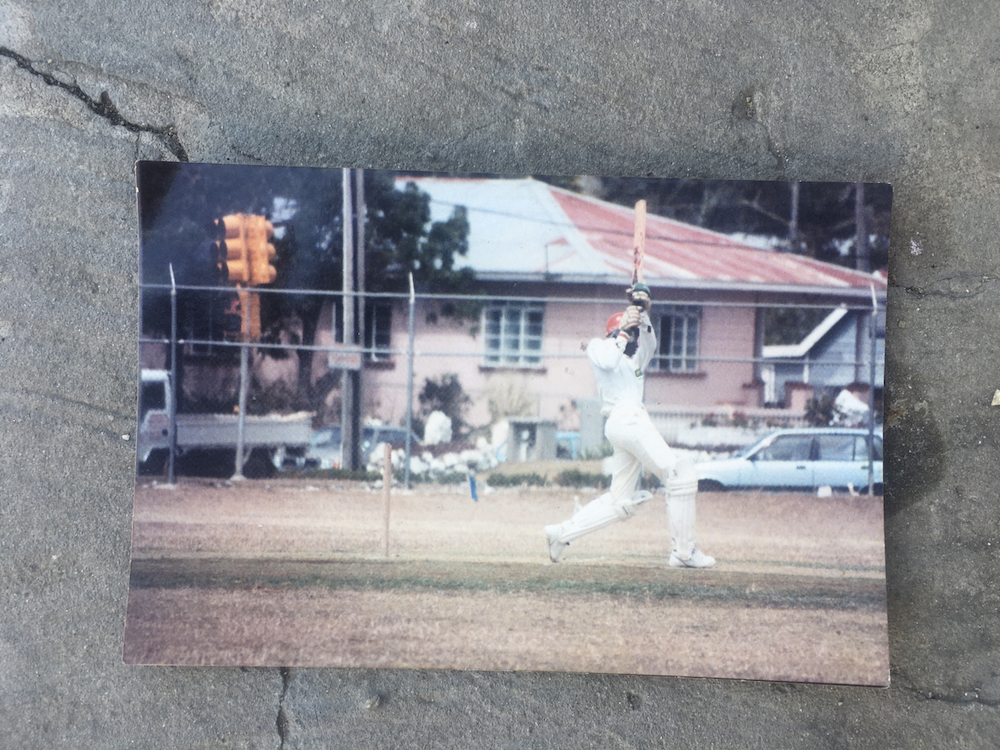
“I was at my peak during that tour. As an all-rounder, I was performing with both bat and ball. And now that I think of it, it was a tough West Indies side that we played against. They had Shivnarine Chanderpaul in that side. It was not an easy matchup but we were up for it and we performed decently as a team on that tour.”
Normally, unions always look to contract a few rookies in their annual contracting. Those rookie contracts were often presented to the top-performing U19 boys. To this day, this is still the case.
“The challenges started when we came back from that tour (SA U19 tour). All the other guys got contracts with their provincial A sides except for me. Perhaps not all of them, but certainly most of the top performers that toured the West Indies. It was painful! I couldn’t understand because I wasn’t even given a reason,” Mahuwa explained.
“You have to remember that at the time we couldn’t talk or we were not given a platform to voice out how we felt. I had my place in that EP A-side but they used the experience to sideline me from that team.
“I couldn’t understand because how was I going to gain experience with them not giving me a chance to showcase my skills at that level? They kept advising me to be patient and that my time would come.”
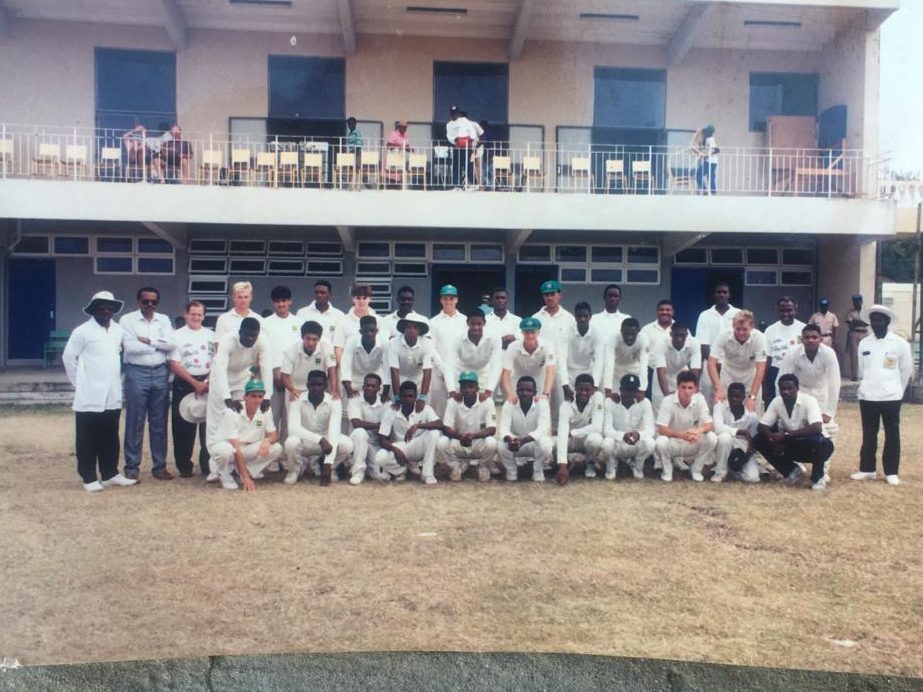
Although the advice never materialized, Mahuwa was still recognized by Nicky Oppenheimer as a talent that could test touring international teams leading up to a Test or ODI series. When India toured South Africa in the summer of 92, Mahuwa and Herschelle Gibbs were two youngsters that featured in the Oppenheimer XI while Clive Rice captained the team.
“When India came here in 92/93. I was called up by Nicky Oppenheimer. We were in the Oppenheimer XI that had Jimmy Cook and them. So I played in that team and was batted at 6 as an all-rounder and I didn’t really mind that because it was still in the top six,” Mahuwa stated.
Throughout this time Mahuwa had no contract which meant no income. He was still living at home in a township called Seyisi in Gqeberha.
“You can imagine the differences in living conditions because we were booked in at Sandton Sun (while in Oppenheimer XI) and when I came back I’m still not contracted which means I’m here in the township,” he said.
“There was already an opening batter in the EP A-side and Kepler Wessels was his partner at the top of the order. That was my main competition for a spot in the A-side.
“I still remember the EP A coach coming to me and asking me to perform to prove my worth for the A-side. This was a few days before the EP B side took on the Griquas in a 3-Day game.
“I scored a hundred not-out in that game and took five wickets. When that game was finished, I didn’t fly to Port Elizabeth (Gqeberha) instead I was flown to Pietermaritzburg because I was selected to play in the President XI that was going to play a Day-Night game against the same India side.
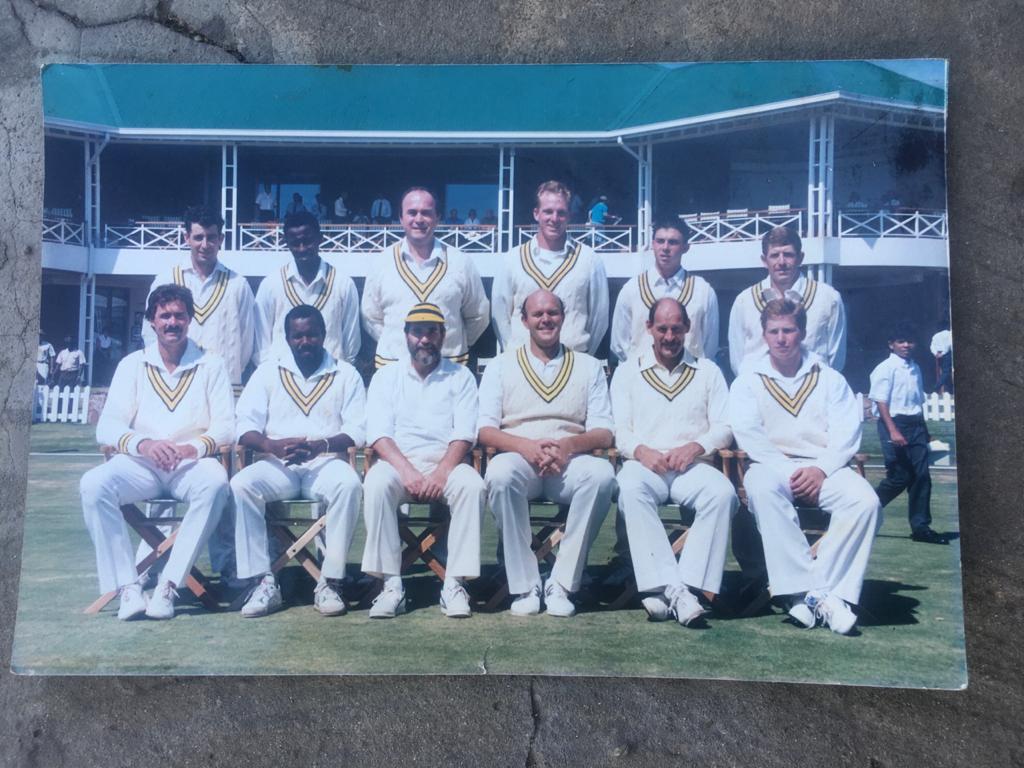
“I batted at 10 in that game. Which is something that really hurt me because I was scoring runs opening the batting. It was tough. But I performed well with the ball in that match.
“When I came back to PE, I was told that Kepler’s opening partner was going to be given another chance even though he didn’t make runs. But I kept quiet. Another match came when we played Western Province B, I scored 60-something in the first innings and 70-not-out in the second innings. When I came back home, I was still not in the EP A-side.
“In 94′, West Indies toured South Africa and I was again invited [to play] in the Nicky Oppenheimer XI but I didn’t play because I was sick the night before so I had 12th-man duties. I came back home, still no contract and no communication,” he added.
The township environment that Kenny was still living in was and still is not an ideal environment for an athlete for a host of different reasons. Among many challenges of being in the township is the lack of proper training facilities. Also, as a young man, the alcohol and drug-ridden streets of Seyisi can be a trap any youngster can find themselves in.

“The EP A coach came to my house and suggested that I should move out of the township and go live in town. When we got to town, I found out that they organized an office at St. George’s Park for me. So my room was an office at St. George’s Park,” said Mahuwa.
“What really frustrated me at the time was the fact that when the A guys would come in to practice, they’d ask me to bowl to them so I was a net bowler. And when I batted, I batted with bowlers and batters bowled at me which wasn’t good enough practice for me as an opening batter.
“I got tired and left the office after about three months living there. I didn’t communicate with the EP people, I just left and did my own things.
“I came back and played for United Cricket Club. In 95′, an SA XI side was selected to tour Malawi for an Africa competition. That side had your Roger Telemachus, Andrew Hall and them. When these guys came back to SA they all got contracts. All that happened to me were promises that never materialized.
“In 96′ I realized I was wasting my time. I told myself that enough is enough. That’s when the drinking started. I don’t blame anyone but I was frustrated,” he concluded.
Writer’s Message:
The importance of telling stories of our legends is that they educate and enlighten us. The purpose is for us to understand the consequences of our ways and do better.

